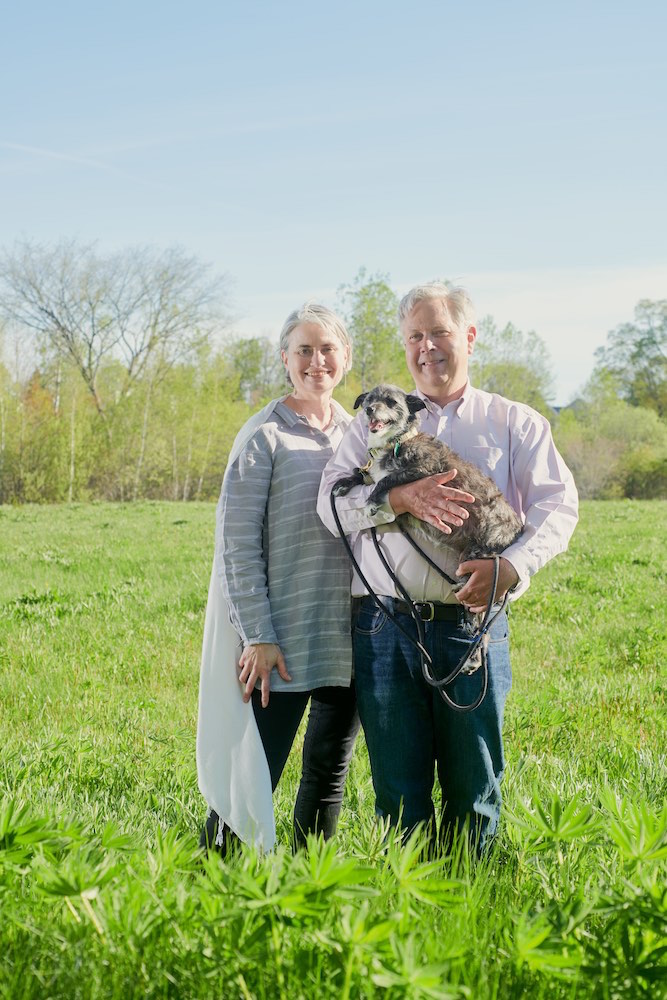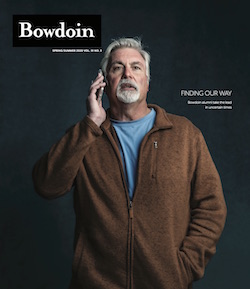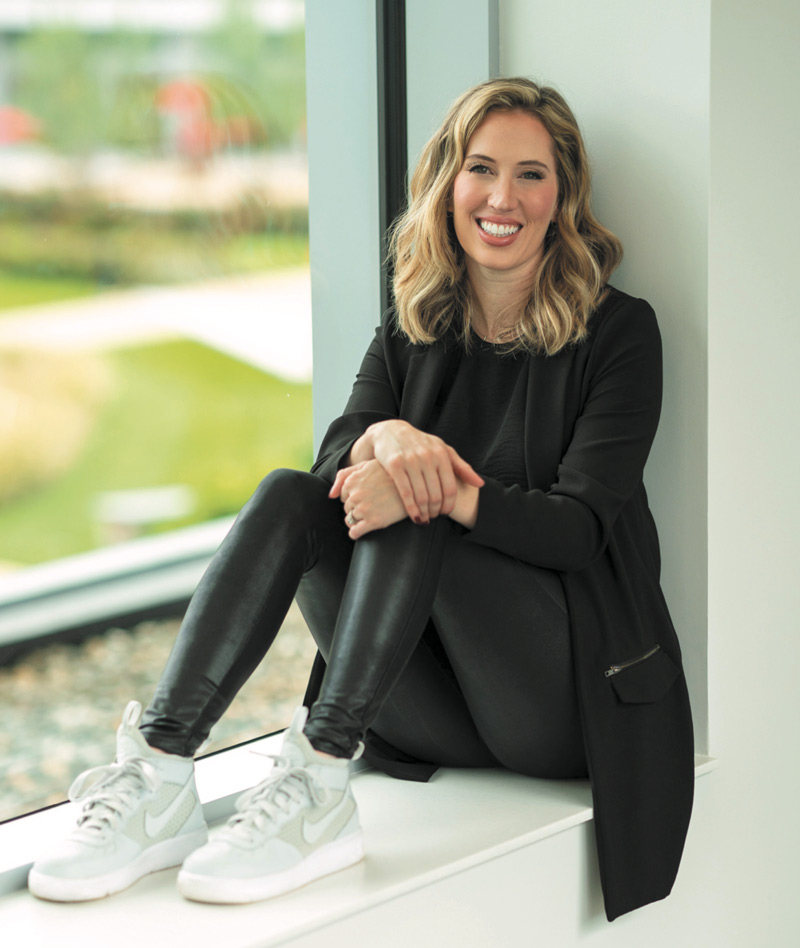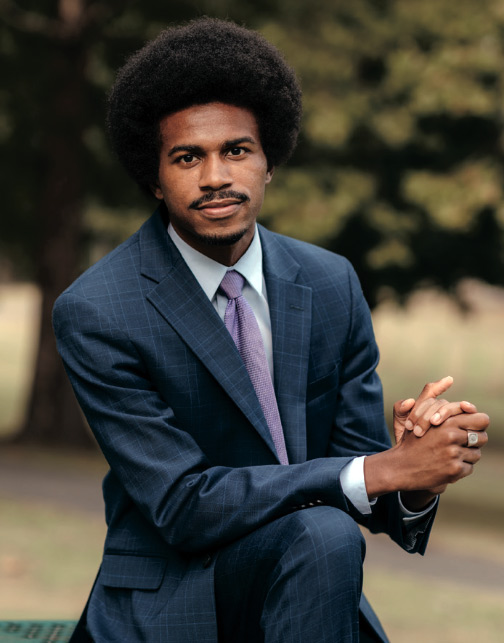Maine Founders
By Bowdoin Magazine
Charlotte Cole ’82, Scott Budde ’81, and their dog, Casco. Photo: Tristan Spinksi
Scott Budde ’81
CEO of Maine Harvest Federal Credit Union
What are your “big picture” goals and objectives for Maine Harvest FCU and what is it about Maine in particular that you believe makes them possible?
Our big picture goal was to become one of Maine’s cornerstone institutions that are building a stronger, healthier, cleaner local food system. We want to be in the same league and impact as Maine Farmland Trust, Maine Organic Farmers and Gardeners Association, and Coastal Enterprises, Inc. We are doing that by giving Maine’s small farms and food producers another source of competitive financing for land and equipment using deposits from folks who share our vision.
What does your day-in-the-life at work look like?
I guess like most start-up CEOs, my job is all over the place—ranging from building our desks and helping install better computer monitor stands to meeting with regulators, clients (for both loans and deposits), and regulators. Functionally, I’m opening accounts, working on the general ledger, developing marketing materials, reconciling the payroll account, speaking at conferences—you name it. I spend about three days a week on site at our office in Unity and two or so days traveling or working from home.
You’ve held big jobs at big companies in big cities around the world. Do you miss any of that? Does your life/work here in Maine feel small by comparison? Why/why not and what, if anything, is good and/or bad about that?
In terms of missing things from a large corporate environment, I do occasionally miss having large internal departments who can sort out IT and operational problems. It does get tiring to learn so many new systems and procedures all at once, but that is part of the challenge and intrigue. Culturally, I miss some things, but I have to add that the most amazing musical performances I’ve been to have been in Maine, simply because some of them have been house concerts where the setting is so intimate you feel like you are almost part of the performance.
I think big organizations and cities are generally overrated. I can walk to many more useful and interesting stores in downtown Portland than I could in mid-town Manhattan. How many Starbucks and Duane Reades does one need to walk to? The coffee at independent coffee houses in Maine is often much better and cheaper. Yes, I drive a lot more but it is very “predictable” driving with much less anxiety. Confession: I don’t think I was much of a big city person in the first place!
Yes, Maine is tight-knit and that has enormously worked to my advantage in starting Maine Harvest Federal Credit Union. When the tight knit-thing works against you, it does feel small by comparison to other places, but this has been very rare in my experience.
The warming of the Gulf of Maine is having a devastating impact on industries and the people and commerce that so rely on it. Please point to something we can be optimistic about where Maine’s food producers are concerned—be that by land or sea.
The number of acres in Maine under organic cultivation is increasing rapidly and we’re doing well attracting and training young farmers.
Other agricultural practices like low-till agriculture and cover cropping are also great news for water quality and environmental sustainability. Also, very important that we now have governor with a strong pro-environment agenda.
Charlotte Cole ’82
Executive Director of Blue Butterfly Collaborative
How did you and your partners come up with the idea for Blue Butterfly? (And where does the name come from?)
I cofounded Blue Butterfly with my sister, Suzanne Cole ’89. Blue Butterfly’s mission is to help producers in low- and middle-income countries develop high-quality children’s educational media to promote international development aims. We provide technical support to in-country teams in production, project management, curriculum development, monitoring and evaluation, and impact research. Blue Butterfly extends the work I began at Sesame Workshop where, for twenty years, I headed the global education department. At Sesame, I oversaw the educational content development and research on over thirty local coproductions of Sesame Street. I worked in Afghanistan, Northern Ireland, the Middle East, China, Indonesia, Mexico, and elsewhere. (There is more about this in a book I edited: The Sesame Effect.) At Blue Butterfly we take this work one step further by helping teams develop their own high-quality content with culturally relevant characters, settings, and stories—so that producers can develop their own intellectual property and children can benefit from content that reflects the lives they lead.
The name Blue Butterfly is inspired by Lorenz’s concept of the “Butterfly Effect” and the idea that small actions can have large impact.
Can you share a little bit about how Blue Butterfly has been engaged with and impacted children in Maine?
Our focus is international, although we did do a small research project with Meridian Stories for the Maine Department of Education. We managed a study of middle schoolers’ use of Meridian Stories’ curriculum-based media creation tool.
What are some of your favorite programming examples that Blue Butterfly has helped to produce?
Our signature project, developed by a Haitian team based in Port-au-Prince, is Lakou Kajou, a Creole-language animated video series for young primary-grade children. (This article in the Miami Herald has a good description.)
In addition to developing new in-country projects, we also work with existing teams to support specific aspects of their programs. For example, we provided research support for the Tsehai Loves Learning program in Ethiopia, and we oversaw the cultural review (working with over thirty different advisors throughout the world) for DreamWorks’ Where’s Waldo animated television series.
How has the pandemic affected your work?
Blue Butterfly is responding to the coronavirus pandemic by providing public education on preventing infection and coping with quarantine and by providing educational resources for children during school closures.
For example, in Haiti, using our animated gecko character, Zando, we developed a series of public service announcements to help families stay safe during the pandemic. These have been distributed in audio, video, and graphic form. We are particularly delighted at the creative ways we are able to get information to people including in two cities, via roaming trucks with loud speakers that have broadcast the messages throughout neighborhood communities.
We are also providing educational resources while children are out of school. In Haiti, for example, we developed an audio series called Ti Lekòl Lakay (Little Home School). It provides daily educational activities for parents to do with their children. These are delivered via WhatsApp and are a way to keep children learning.
Is there anything else you’d like to add?
I learned to walk at Bowdoin. Literally. My father (Taylor Cole ’45), who was a high school teacher, was a participant at a weeks-long conference at Bowdoin for math educators. A baby at the time, I spent the summer months in residence in Brunswick and that is where I took my first steps. No one could have anticipated (particularly since at the time, Bowdoin was all male) that seventeen years later I’d become a student there.

This story first appeared in the Spring/Summer 2020 issue of Bowdoin Magazine. Manage your subscription and see other stories from the magazine on the Bowdoin Magazine website.



